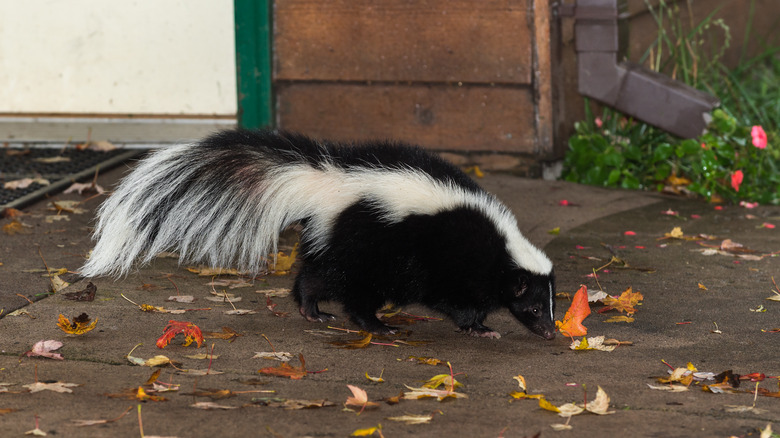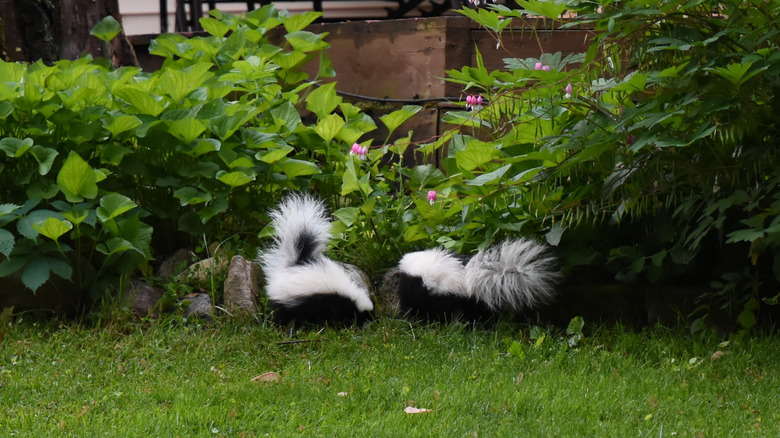If You Have Skunks Living Under Your Deck Or Shed, Do This Immediately
It's hard to dismiss the repugnant odor of a skunk, which is, understandably, why you don't want them living under your deck or shed. Most skunks go looking for a place to live during spring and summer when mothers are about to have their babies. So, while they are stinky pests, you may prefer a more humane route of evicting them. One of the best natural ways to get them to move out is by using a powerful skunk repellent like apple cider vinegar. Place a vinegar-soaked rag into a bag with holes in it and put the bag near the entrance or inside the den. The skunk may get scared that a predator is spreading their scent around the area and will eventually leave.
Other than their recognizable smell, you can also tell if a skunk is living in your vicinity through a number of signs. They are vocal beings, so you may hear them chirping, squealing, or hissing. If they've moved in under your shed, you'll hear them digging and rummaging under the floorboards. You'll also notice tracks, den entrances, and signs of their excrement. Skunks go into a state during winter called torpor. So, they go looking for a safe space, like under your deck or shed, to sleep for long periods of time.
Humane ways to evict skunks
Skunks aren't the most considerate neighbors and you'll find dead giveaways there's a skunk living in your yard. They can cause damage to the building structures on your property, leave holes in your lawn, and mark their territory with a powerful stench. To get the skunks to move out from under your deck or shed, you need the right combination of light, noise, and smell. Since skunks are sensitive to light, you'll want to set up a fire-safe bright light to shine to the entrance of wherever they've claimed their home. Use beneficial lawn features for a skunk-free property, like motion-activated lights or sprinklers, which will scare them with sudden bursts of activity.
Skunks don't like the smell of vinegar. So you can try using apple cider vinegar-soaked rags to threaten their sense of safety. You'll need to reapply vinegar to the rag for this method to be effective. Other smells skunks don't like that you could also try are dirty cat litter, coyote urine, and synthetic repellent products. Another option for getting skunks out from under your deck and shed is to keep track of when they leave their den and notice when they're gone, so that you can board it closed and they can't get back in. If the skunks are stubborn and refuse to leave, you can call your professional local animal, critter, or wildlife control center.
Keep the skunks away
Skunks, like other animals, are attracted to food sources. So, one of the first steps to reduce the appeal of taking up residency under your deck or shed, is to put all pet food, grains, and other edible food sources into sealed containers. They also prey on rodents, bugs, and trash. So look for signs of infestations, eradicate if you can, and keep trash picked up. Once their food source is gone, the next step is to patch up any openings around the base of your deck and around your shed. Use chicken wire or wire mesh below the ground of your deck and shed to block them from digging an entrance to their den. Strong barriers around entry points will withstand any break-in attempts made by skunks or anything else.
While skunks may be a nuisance, they can play a beneficial role in keeping other unwanted pests and bugs out of your yard. They feed on rodents that burrow underground, like mice and moles, as well as beetles, snails, and grubs that can damage your lawn and garden. But, since these critters can still cause damage, there are also garden-friendly methods for your skunk removal efforts. Consider using plants to deter skunks. Border the area with a thick, thorny hedge to make it difficult for them to enter your yard. You can also try planting crown imperial flowers for their repellent odor, or summer squash for the hairy leaves that may irritate skunk paws.


